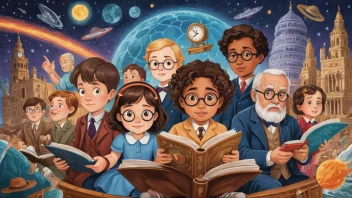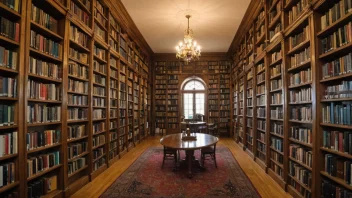Literature is a reflection of the human experience, capturing the essence of different cultures, societies, and eras. Classics, in particular, hold a special place in the literary canon, transcending time and geography to resonate with readers across generations. From the tragic tales of ancient Greece to the poignant narratives of modernity, these masterpieces invite us to explore a multitude of themes, emotions, and perspectives. In this article, we will journey through some of the must-read classics from around the world, illuminating their significance and the reasons they continue to captivate audiences today.
1. "Pride and Prejudice" by Jane Austen (England)
Published in 1813, Jane Austen's "Pride and Prejudice" is a timeless exploration of love, societal expectations, and the complexities of human relationships. Set in the English countryside, the novel follows Elizabeth Bennet as she navigates the intricacies of class, family dynamics, and her evolving feelings for the enigmatic Mr. Darcy. Austen's sharp wit and keen observations of her characters' follies make this novel both entertaining and enlightening, establishing it as a cornerstone of English literature.
2. "One Hundred Years of Solitude" by Gabriel García Márquez (Colombia)
Regarded as one of the most significant works of magical realism, Gabriel García Márquez's "One Hundred Years of Solitude" chronicles the Buendía family over several generations in the fictional town of Macondo. Published in 1967, this novel weaves together the extraordinary and the everyday, blending myth and reality to explore themes of solitude, fate, and the cyclical nature of history. Márquez's lyrical prose and rich storytelling invite readers to reflect on the complexities of Latin American identity and the human condition.
3. "The Brothers Karamazov" by Fyodor Dostoevsky (Russia)
Fyodor Dostoevsky's "The Brothers Karamazov," published in 1880, is a philosophical and moral exploration of faith, doubt, and the nature of evil. The story revolves around the Karamazov brothers—Dmitri, Ivan, and Alexei—and their tumultuous relationships with their father and one another. Through the intricate dialogue and profound psychological insights, Dostoevsky delves into existential questions that continue to resonate with readers. This novel is often regarded as one of the author’s greatest achievements, solidifying his place in the pantheon of literary giants.
4. "Things Fall Apart" by Chinua Achebe (Nigeria)
Published in 1958, Chinua Achebe's "Things Fall Apart" is a poignant narrative that examines the impact of colonialism on African culture and identity. The novel follows Okonkwo, a respected leader in the Igbo community, whose life unravels as British colonists and Christian missionaries disrupt traditional ways of life. Achebe's portrayal of the clash between indigenous and Western cultures offers a critical perspective on history and identity, making it a seminal work in postcolonial literature.
5. "The Metamorphosis" by Franz Kafka (Austria-Hungary)
Franz Kafka's "The Metamorphosis," first published in 1915, is a surreal tale that explores themes of alienation and the absurdity of existence. The story centers on Gregor Samsa, who awakens one morning to find himself transformed into a monstrous insect. Kafka's exploration of identity and societal expectations resonates deeply in the modern world, reflecting the struggles of individuals in an increasingly dehumanizing society. This novella is a cornerstone of existential literature, prompting readers to confront uncomfortable truths about their own lives.
6. "The Great Gatsby" by F. Scott Fitzgerald (United States)
F. Scott Fitzgerald's "The Great Gatsby," published in 1925, is a quintessential American novel that captures the essence of the Roaring Twenties. Through the eyes of the narrator, Nick Carraway, we witness the extravagant lifestyle of Jay Gatsby and the elusive pursuit of the American Dream. Fitzgerald's exploration of wealth, love, and disillusionment paints a vivid picture of a society in flux, making this novel a critical commentary on the American experience that remains relevant today.
7. "The Tale of Genji" by Murasaki Shikibu (Japan)
Often considered the world's first novel, Murasaki Shikibu's "The Tale of Genji" was written in the early 11th century and offers a glimpse into the court life of Heian-era Japan. The story follows the life and loves of Hikaru Genji, a nobleman known for his beauty and charm. Through its intricate narrative and rich character development, this work delves into themes of love, loss, and the fleeting nature of life, showcasing the depth of human emotion and the aesthetics of Japanese culture.
8. "To Kill a Mockingbird" by Harper Lee (United States)
Harper Lee's "To Kill a Mockingbird," published in 1960, is a powerful exploration of racial injustice and moral growth in the American South. Through the eyes of young Scout Finch, readers witness the complexities of human behavior and the fight for justice as her father, Atticus Finch, defends a black man falsely accused of raping a white woman. Lee's poignant narrative challenges readers to confront their beliefs and biases, making it a crucial text in discussions of race and ethics.
9. "The Alchemist" by Paulo Coelho (Brazil)
Paulo Coelho's "The Alchemist," published in 1988, is a modern classic that tells the story of Santiago, a shepherd who embarks on a journey to discover his personal legend. This allegorical tale emphasizes the importance of dreams, self-discovery, and the interconnectedness of all things. Coelho's simple yet profound writing has touched millions of readers worldwide, inspiring them to pursue their passions and listen to their hearts.
10. "The Picture of Dorian Gray" by Oscar Wilde (Ireland)
Oscar Wilde's "The Picture of Dorian Gray," published in 1890, is a dazzling exploration of aestheticism, morality, and the nature of beauty. The story follows Dorian Gray, a young man who becomes enamored with his own portrait, leading him to pursue a life of indulgence while the painting ages and bears the consequences of his actions. Wilde's sharp wit and profound insights into human nature make this novel a captivating read, prompting readers to reflect on the values they hold dear.
In conclusion, these must-read classics from around the world not only offer insight into the cultures and societies from which they originate but also provide timeless reflections on the human experience. Engaging with these works allows readers to traverse different eras and perspectives, fostering a deeper understanding of the world and ourselves. As we delve into the pages of these literary treasures, we find that the themes of love, loss, identity, and morality continue to resonate, reminding us of our shared humanity and the power of storytelling.






